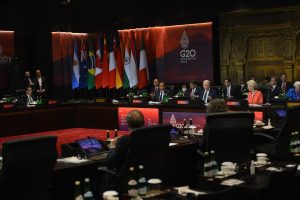The 17th annual summit of Heads of State and Heads of Government of the Group of Twenty (G-20) – the world’s most powerful economies – was held from November 15-16 in Bali, Indonesia. It was Indonesia’s first chance to host the grouping. Chaired by Indonesian President Joko “Jokowi” Widodo, the conference was overshadowed by Russia’s senseless war against Ukraine, with world powers overwhelmingly divided.
Seventeen world leaders had gathered for the Bali summit, including U.S. President Joe Biden and Chinese President Xi Jinping. Russia’s President Vladimir Putin did not attend the summit but sent Foreign Minister Sergei Lavrov in his stead.
Formed on September 26, 1999, in the aftermath of the Asian financial crisis, the G-20 remains a leading international forum of the key developed and emerging nations to deal with global economic and financial issues as well as other pressing problems.
Today, the G-20 represents 54 percent of the world’s land mass, over 80 percent of the world’s GDP, 75 percent of international trade, 60 percent of the world’s population, and about 81 percent of the global greenhouse gas emissions.
Notably, the G-20 was quite effective in addressing the global COVID-19 pandemic through the free distribution of vaccines to the world. However, there were no significant developments at the G-20 in the fight against global climate change, especially in reducing ominously high greenhouse gas emissions.
Under this year’s theme – “Recover Together, Recover Stronger” – the G-20 Summit underscored three major priorities: strengthening global health architecture, digital transformation, and realizing a sustainable energy transition with a view to fashioning a sustainable future.
In his opening remarks at the summit, Jokowi appealed to members for cooperation, despite profound divisions over Russia’s invasion of Ukraine. “We have no other option, collaboration is needed to save the world,” he said. “[The] G-20 must be the catalyst for inclusive economic recovery.” However, the Indonesian president also noted that “being responsible here also means that we must end the war.”
At the summit, Biden denounced Russia’s aggression and made efforts to secure support against Putin.
Xi cautioned against the “weaponization” of food and energy. Notably, the Chinese president also used the meeting to launch what might be called a reset of relations with the United States and Australia. Both relationships have been dented by hostility and diplomatic rancor, but Xi held cordial meetings with both Biden and Australia’s Prime Minister Anthony Albanese.
British Prime Minister Rishi Sunak urged Russia to “get out of Ukraine” as he vehemently denounced its “barbaric war.” Indian Prime Minister Narendra Modi renewed his calls for a “return to the path of ceasefire and diplomacy in Ukraine.” The war has now dragged on for nearly nine months, putting hefty pressure on the global economy through rising energy, food, and fuel prices.
In a video link, Ukrainian President Volodymyr Zelenskyy called on the world leaders to end the Russian invasion to protect Ukraine’s territorial integrity.
However, Russia challenged global calls to end the war in Ukraine. Lavrov condemned what he called “politicization” of the G-20 meeting before abruptly leaving a day early.
At the conclusion of the summit, the leaders issued a comprehensive joint statement. They recognized cooperation is irrefutably vital for global economic recovery, dealing with formidable global challenges and building the “foundation for strong, sustainable, balanced, and inclusive growth.”
Remarkably, the Bali Leaders’ Declaration also affirmed that “most members strongly condemned the war in Ukraine and stressed it is causing immense human suffering and exacerbating existing fragilities in the global economy – constraining growth, increasing inflation, disrupting supply chains, heightening energy and food insecurity, and elevating financial stability risks.”
Unquestionably, it was a blunt declaration, revealing the isolation of Russia over its unprovoked invasion of Ukraine.
The communique, likely at the insistence of Russia and China, recognized that some countries have “other views and different assessments of the situation and sanctions.” But the emphasis was undeniably on denouncing the war.
International law must be upheld, the communique also said, stressing that the “use or threat of use of nuclear weapons is inadmissible.” It urged the “peaceful resolution of conflicts, efforts to address crises, as well as diplomacy and dialogue.” Borrowing a phrase from India’s Modi, the declaration stressed, “Today’s era must not be of war.”
Returning to the grouping’s economic focus, the G-20 leaders promised to take “coordinated actions to advance an agenda for a strong, inclusive and resilient global recovery and sustainable development that delivers jobs and growth.”
The communique also added members’ central banks would “continue to appropriately calibrate the pace of monetary policy tightening.”
However, as long as distrust and deepening tensions continue to persist among major powers – especially the United States, China, and Russia – all the daunting political and economic challenges that need collective and coordinated actions would probably remain unresolved, triggering untold sufferings to the people.
It is imperative for the G-20 leaders to continuously monitor implementation of the commitments that were made in the declaration, particularly for strong global economic recovery, peace, security, and sustainable development.

































